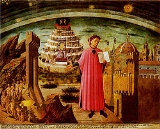
The Divine Comedy
Overview
The Divine Comedy is an epic poem written by Dante Alighieri
between 1308 and his death in 1321. It is widely considered the preeminent work of Italian literature
, and is seen as one of the greatest works of world literature
. The poem's imaginative and allegorical
vision of the afterlife
is a culmination of the medieval world-view
as it had developed in the Western Church
. It helped establish the Tuscan dialect
, in which it is written, as the standardized Italian language
. It is divided into three parts, the Inferno
, Purgatorio
, and Paradiso
.
On the surface, the poem describes Dante's travels through Hell, Purgatory, and Heaven; but at a deeper level, it represents allegorically
the soul's journey towards God.
Dante Alighieri
Durante degli Alighieri, mononymously referred to as Dante , was an Italian poet, prose writer, literary theorist, moral philosopher, and political thinker. He is best known for the monumental epic poem La commedia, later named La divina commedia ...
between 1308 and his death in 1321. It is widely considered the preeminent work of Italian literature
Italian literature
Italian literature is literature written in the Italian language, particularly within Italy. It may also refer to literature written by Italians or in Italy in other languages spoken in Italy, often languages that are closely related to modern Italian....
, and is seen as one of the greatest works of world literature
World literature
World literature refers to literature from all over the world, including African literature, American literature, Arabic literature, Asian literature, Australasian literature, Caribbean Literature, English literature, European literature, Indian literature, Latin American literature, Persian...
. The poem's imaginative and allegorical
Allegory
Allegory is a demonstrative form of representation explaining meaning other than the words that are spoken. Allegory communicates its message by means of symbolic figures, actions or symbolic representation...
vision of the afterlife
Afterlife
The afterlife is the belief that a part of, or essence of, or soul of an individual, which carries with it and confers personal identity, survives the death of the body of this world and this lifetime, by natural or supernatural means, in contrast to the belief in eternal...
is a culmination of the medieval world-view
Medieval philosophy
Medieval philosophy is the philosophy in the era now known as medieval or the Middle Ages, the period roughly extending from the fall of the Western Roman Empire in the fifth century AD to the Renaissance in the sixteenth century...
as it had developed in the Western Church
Roman Catholic Church
The Catholic Church, also known as the Roman Catholic Church, is the world's largest Christian church, with over a billion members. Led by the Pope, it defines its mission as spreading the gospel of Jesus Christ, administering the sacraments and exercising charity...
. It helped establish the Tuscan dialect
Tuscan dialect
The Tuscan language , or the Tuscan dialect is an Italo-Dalmatian language spoken in Tuscany, Italy.Standard Italian is based on Tuscan, specifically on its Florentine variety...
, in which it is written, as the standardized Italian language
Italian language
Italian is a Romance language spoken mainly in Europe: Italy, Switzerland, San Marino, Vatican City, by minorities in Malta, Monaco, Croatia, Slovenia, France, Libya, Eritrea, and Somalia, and by immigrant communities in the Americas and Australia...
. It is divided into three parts, the Inferno
Inferno (Dante)
Inferno is the first part of Dante Alighieri's 14th-century epic poem Divine Comedy. It is followed by Purgatorio and Paradiso. It is an allegory telling of the journey of Dante through what is largely the medieval concept of Hell, guided by the Roman poet Virgil. In the poem, Hell is depicted as...
, Purgatorio
Purgatorio
Purgatorio is the second part of Dante's Divine Comedy, following the Inferno, and preceding the Paradiso. The poem was written in the early 14th century. It is an allegory telling of the climb of Dante up the Mount of Purgatory, guided by the Roman poet Virgil...
, and Paradiso
Paradiso (Dante)
Paradiso is the third and final part of Dante's Divine Comedy, following the Inferno and the Purgatorio. It is an allegory telling of Dante's journey through Heaven, guided by Beatrice, who symbolises theology...
.
On the surface, the poem describes Dante's travels through Hell, Purgatory, and Heaven; but at a deeper level, it represents allegorically
Allegory in the Middle Ages
Allegory in the Middle Ages was a vital element in the synthesis of Biblical and Classical traditions into what would become recognizable as Medieval culture...
the soul's journey towards God.
Unanswered Questions
Discussions

